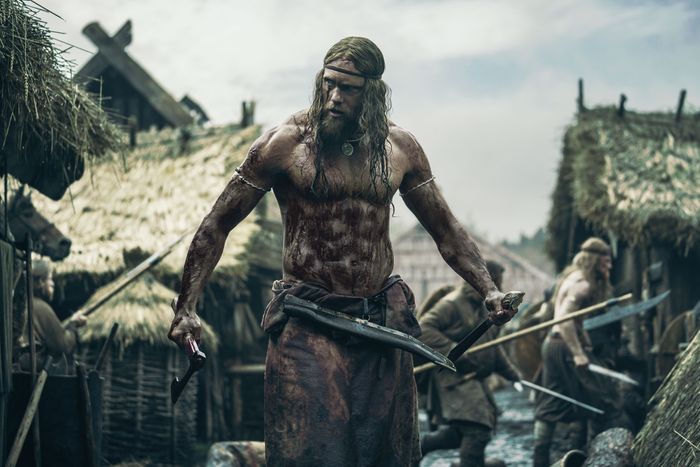
Nicole Kidman plays a Norse queen whose husband is murdered and who ends up married to the murderer, her former brother-in-law. In Hamlet, she’d be Gertrude, but in the The Northman, which takes for its source material the brawnier, grislier legend on which the Shakespeare play is based, she’s named Gudrún, and she’s slung over the shoulder of her still-bloody new spouse Fjölnir (Claes Bang) and carried off as the spoils of fratricide. Watching from a hiding spot, her young son Amleth adds to the murderous to-do list as he flees into the night muttering, “I will avenge you, Father. I will save you, Mother. I will kill you, Fjölnir.” And yet, when he makes his way back to Gudrún as an adult played by a hulking Alexander Skarsgård, Amleth is thrown to discover that his mother appears to be happy with Fjölnir, with whom she’s since had a son. She challenges Amleth’s assumption that it was Fjölnir she needed to be rescued from, showing him the slave brand on her chest and taunting him for believing his parents’ marriage was actually the fairy-tale joining of noble families he’d been told.
Kidman’s a scream in The Northman, and in a revisionist take on its tale, Gudrún would be a tragic feminist anti-heroine trying to engineer a life she wants from her unwilling perch in a society shaped around what she describes as savagery. But in this film, she’s practically demonic in that moment, a degenerate flying in the face of the particular Viking social order Amleth has dedicated himself to restoring. It’s not that her desires are unsympathetic — on the contrary, Gudrún, with her thoughts on good leadership and her desire to choose a caring mate, may be more relatable than any other character in the film. But relatability is the last thing on The Northman’s mind. The film is the third from writer-director Robert Eggers, who shares a screenplay credit here with the Icelandic poet and novelist Sjón. And like Eggers’s previous work, it’s interested in not just re-creating the details and texture of a past era but also its way of thinking. The Northman is a gloriously ruthless saga involving sorcery, the immutability of fate, sackings and stormy journeys at sea and a nude sword fight in the shadow of a volcano. But its most notable quality is the way it refuses to bend its characters to the present, preferring instead to make them as alien in their perspective as possible. The Northman doesn’t invite its viewers into its world, but instead dares them to try to catch up.
There’s an inevitable distancing effect to this approach, though that’s refreshing into itself. Eggers’s debut feature, The Witch, strove to re-create the world as seen by its Puritan colonists — not just in the minutiae of their desperate efforts to carve survival for themselves out of the unforgiving wilderness, but in their certainty that the Devil was real and present and actively working against them in tangible ways. The Northman may be about the familiar motivation of revenge, but it’s even more remote in its belief system. Amleth’s father, King Aurvandil (Ethan Hawke), talks about how shameful it would be to grow old instead of dying in battle and ascending to Valhalla. Amleth is named his successor in a ceremony in which he pretends to be a dog, laps up a hallucinogenic potion, and sees a vision of his ancestors’ bodies hanging from a tree. As a grimy grown-up striated with muscles and with shoulders so broad they seem to weigh him down — no one has ever been more born for a role than Skarsgård was for this one — Amleth becomes a berserker, slaughtering his way with unpretty skill through a Rus village, then meandering indifferently through the aftermath of raping and pillaging like a retail worker who’s finally off the clock. When he encounters a seeress played by Björk, one of several witches he meets along the way, she reasonably points out that he’s been terrorizing her people and then reminds him of his avowed mission anyway, as though his fate were simply bigger than the day-to-day lives of the villagers being rounded up to be sold for labor.
“These savages make for fine chattel,” Amleth’s cohort observes in one of the screenplay’s balder moments. Savagery is in the eye of the beholder, and The Northman is fiercely committed to rooting itself in a particular perspective, even when Amleth meets a wily Rus captive, Olga (Anya Taylor-Joy), who becomes his ally and his lover. When so much recent media has bent history to accommodate more modern points of view, there’s something spectacular about Eggers’s refusal to soften his protagonist in any way or to have him learn the sort of lessons a 2022 story demands. You don’t need to understand Amleth’s values to invest in his brutal journey, which is filled with heart-pounding set pieces and unabashed badassery — I was partial to the moment he casually catches a spear hurled down at him from the battlements and then tosses it back. The Northman benefits from surrendering to that sense of remove, to its hero’s unforgiving understanding of the universe having been created to reward violence. You wouldn’t want to see him striding up to the walls of your settlement, but hard-core moments like the one in which Amleth disguises himself as a slave are easy to appreciate. He doesn’t just pick up an iron from the fire and use it to brand his own skin; he mutters to the tool that, should he meet its owner, “I will thank him for the warmth you gave to me.” Metal!
More Movie Reviews
- The Accountant 2 Can Not Be Taken Seriously
- Another Simple Favor Is So Fun, Until It Gets So Dumb
- Errol Morris Has Been Sucked Into the Gaping Maw of True Crime


